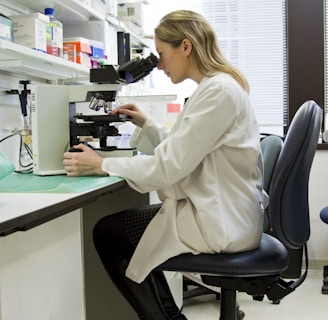Cutting NIH Summer Internships: A Costly Mistake That Could Set Back American Medical Research
Threatening the Future of American Medical Innovation? The National Institutes of Health (NIH) Summer Internship Program (SIP) has been recognized as a vital training ground for the next generation of biomedical researchers. This program not only shapes individual careers through invaluable hands-on experience but also significantly enhances America's broader scientific and economic strength.
FEDERAL GOVERNMENTMEDICALEDUCATION
Dr. Shawn Granger
2/27/20253 min read


Investing in Tomorrow’s Innovators
Every summer, the NIH offers internships to hundreds of promising undergraduate and graduate students. These interns receive monthly stipends based on their educational level and experience. According to the National Institute of Environmental Health Sciences (2023), undergraduate interns earn between $3,010 and $3,310 per month, while graduate students receive between $3,480 and $4,190 monthly. With the average internship lasting about eight weeks, the NIH’s investment per intern ranges roughly from $6,020 to $8,380—a modest amount compared to the NIH's overall budget of nearly $48 billion, of which over 80% funds extramural research projects (Latham BioPharm Group, 2025).
Why NIH Internships Matter
Beyond individual enrichment, NIH internships significantly contribute to national interests. They are essential in cultivating a strong STEM workforce capable of tackling urgent public health challenges. Alumni frequently move into influential careers in academia, healthcare, biotech industries, and government research institutions, translating their internship experiences into innovative breakthroughs and improved public health outcomes.
Inspiring Success Stories
The significance of the SIP is evident through numerous success stories:
Keolu Fox, an alumnus of the 2010 NIH Diversity Action program, has been leading genetic research to address health disparities impacting Polynesian populations, especially in his native Hawaiian community (National Human Genome Research Institute, 2012).
Alessandra Coogan, a participant in the NIH Biomedical Engineering Summer Internship Program (BESIP) for 2024, contributed groundbreaking research in drug delivery systems and tissue engineering. Her work has advanced vital treatments for severe fungal infections impacting the respiratory tract (George Mason University, 2024).
Sachi Pathak, a medical student at Oklahoma State University, used her 2023 NIH internship to explore HIV latency, honing essential research skills that will influence her future medical career (Oklahoma State University, 2023).
These individual narratives highlight the significant and enduring impact of the NIH SIP, illustrating how focused investment in student researchers drives innovation that benefits society as a whole.
The Risk of Short-Term Thinking
Recent policy changes under Elon Musk’s DOGE initiative and former President Donald Trump have introduced severe budgetary constraints. Most notably, the NIH announced a controversial decision on February 7, 2025, to limit indirect cost rates to just 15%—significantly lower than previously negotiated rates (Latham BioPharm Group, 2025). Such sudden policy shifts have resulted in funding shortfalls and institutional budget crises, ultimately necessitating difficult cuts, including the cancellation of programs like SIP.
The loss of SIP may provide immediate savings but has significant long-term implications. Without these internships, promising young students could be deterred from pursuing STEM careers due to a lack of mentorship and exposure. Such outcomes risk creating a talent vacuum, potentially stifling innovation and undermining America’s global leadership in biomedical research.
The True Cost of Funding Cuts
Although the NIH’s policy changes aim to save around $4 billion (Inside Higher Ed, 2025), this decision overlooks potential downstream economic and public health consequences. Fewer internships result in fewer trained researchers capable of rapidly responding to future public health emergencies and slower progress in medical research, which could lead to higher healthcare costs in the long run. Additionally, increased reliance on private-sector research may elevate costs and diminish access to medical advancements.
Protecting America’s Future
Budget decisions should take into account long-term impacts alongside immediate savings. Investments in NIH internships provide returns that greatly surpass their initial costs, significantly contributing to scientific innovation, economic growth, and public health security. Protecting and nurturing these programs is vital if America aims to remain a global leader in biomedical research.
The NIH Summer Internship Program is more than just an educational opportunity; it’s an investment in our nation's health, economy, and future. Cuts to such foundational programs risk much more than monetary loss—they jeopardize America's ability to innovate, conduct research, and lead on the global stage.
References
George Mason University. (2024, September 16). Bioengineering alumna completes a fun(gal) summer internship with NIH. Retrieved from https://honors.sitemasonry.gmu.edu/news/2024-09/bioengineering-alumna-completes-fungal-summer-internship-nih
Inside Higher Ed. (2025, February 8). Higher ed leaders warn of dire consequences after NIH funding cuts. Retrieved from https://www.insidehighered.com/news/government/science-research-policy/2025/02/08/higher-ed-leaders-warn-dire-consequences-after
Latham BioPharm Group. (2025, February 7). The NIH funding cuts: Implications and status of lawsuits. Retrieved from https://www.lathamreg.com/2025/02/the-nih-funding-cuts-implications-and-status-of-lawsuits/
National Human Genome Research Institute. (2012, April 9). NIH summer student alum wins Best Graduate Student Presentation award. Retrieved from https://www.genome.gov/27548221/2012-news-feature-nih-summer-student-alum-wins-best-graduate-student-presentation-award
National Institute of Environmental Health Sciences. (2023, May 1). Summer internship program: Salary. Retrieved from https://www.niehs.nih.gov/careers/research/summers/salary
Oklahoma State University. (2023, September 21). OSU med student spends summer as NIH research intern. Retrieved from https://news.okstate.edu/articles/health-sciences/2023/osu-com-med-student-sachi-pathak-nih-summer-internship-rashmi-kaul.html
